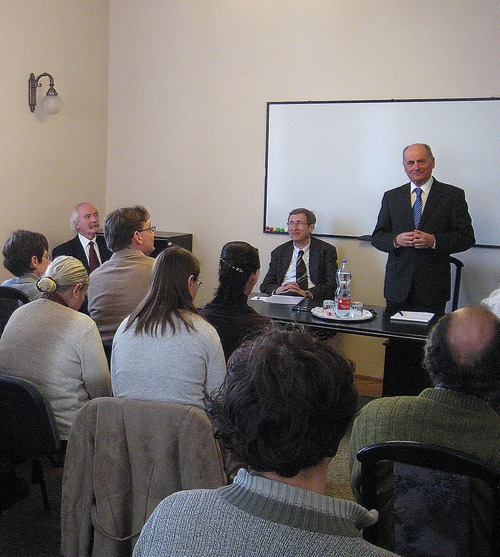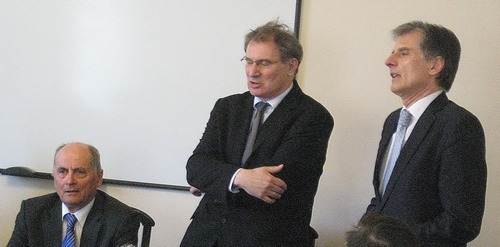 On 3rd March, 2012, Ján Čarnogurský, a former Prime Minister of Slovakia (1991–1992) and the former chairman of the Christian Democratic Movement (1990–2000) was our guest in the History Institute. In his lecture he spoke about “The birth of Slovakia”, a period and process which he not only lived through but also took an important part in shaping.
On 3rd March, 2012, Ján Čarnogurský, a former Prime Minister of Slovakia (1991–1992) and the former chairman of the Christian Democratic Movement (1990–2000) was our guest in the History Institute. In his lecture he spoke about “The birth of Slovakia”, a period and process which he not only lived through but also took an important part in shaping.
He was a co-founder and, since February 1990, the chairman of the Christian Democratic Movement of Slovakia. Since it was Slovakia's second largest party after the Slovak parliamentary election, 1990, Čarnogurský became the vice-prime minister of Slovakia and in June 1990, after the Movement for a Democratic Slovakia split from the Public against Violence (from the party that had won the 1990 elections), Čarnogurský took over the post of the prime minister of Slovakia in April 1991. This period was characterized by debates between Czechs and Slovaks concerning the future of their co-existence. After the 1992 election he was a deputy to the National Council of the Slovak Republic (Slovak parliament) as an opposition member and strong Mečiar opponent from 1992 to 1998. In July 1992 Slovakia declared itself a sovereign state, meaning that its laws took precedence over those of the federal government. In November the federal parliament voted to dissolve the country officially on 31 December 1992. After the 1998 election Čarnogurský was the Minister of Justice of Slovakia from 1998 to 2002. After that he retired from politics.
Now Ján Čarnogurský is the chair of the Board of the European Network Remembrance and Solidarity, which has emerged as an initiative of four countries: Germany,  Hungary, Poland and Slovakia aimed at broadening knowledge on Europe’s history in the 20th Century, in particular on totalitarian regimes, its victims and consequences that last until now. ENRS wants to contribute to creation of community of memory which will take into consideration different experiences of nations and countries of Europe. The important thing is that the goal of the ENRS is not creation of equalized and normalized European interpretation of history. Instead, the aim is rather creation of opportunities to compare national images of memory which can complement each other. The Network is expected to help to solve misunderstandings concerning historical questions and will contribute to eradication of stereotypes, building up mutual respect and better understanding among the Europeans.
Hungary, Poland and Slovakia aimed at broadening knowledge on Europe’s history in the 20th Century, in particular on totalitarian regimes, its victims and consequences that last until now. ENRS wants to contribute to creation of community of memory which will take into consideration different experiences of nations and countries of Europe. The important thing is that the goal of the ENRS is not creation of equalized and normalized European interpretation of history. Instead, the aim is rather creation of opportunities to compare national images of memory which can complement each other. The Network is expected to help to solve misunderstandings concerning historical questions and will contribute to eradication of stereotypes, building up mutual respect and better understanding among the Europeans.



